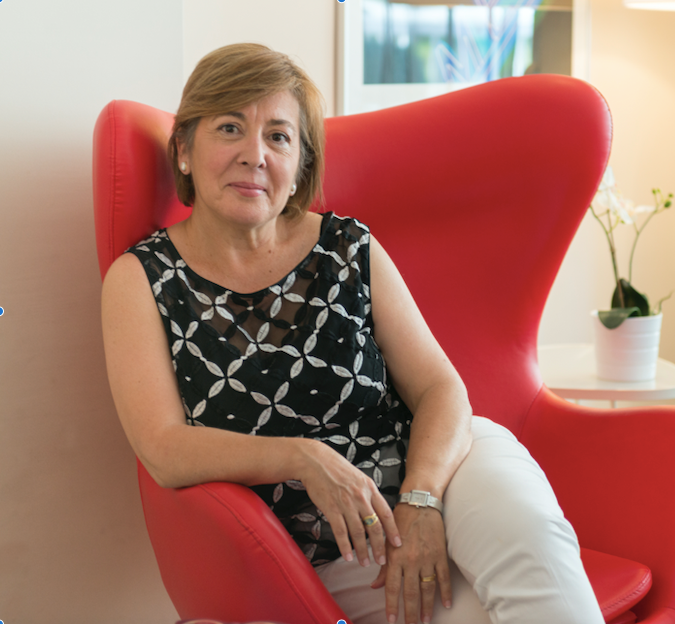Dr. Cristina Sanz: Bridging Student Learning and Faculty Research in Barcelona

Posted in News Story | Tagged Barcelona, Cristina Sanz, Language Learning
It is no secret that, given the right conditions, learning a language while abroad is more effective than learning a language in the classroom. Interactions with native speakers increase learners’ exposure to the language and force them to realize how language works in real world interactions. This push to monitor what they say and how they say it facilitates connections often outside of conscious awareness and helps the second language become more deeply planted in the learner’s mind.
Dr. Cristina Sanz, a professor in the Department of Spanish and Portuguese who studies the cognitive and pedagogical aspects of language acquisition, is very interested in how study abroad maximizes student language learning.
Professor Sanz, a past recipient of the Dean’s Award for Excellence in Undergraduate Teaching, is professor of Spanish Linguistics and the director of Georgetown’s Intensive and SFS Spanish Programs. Last year, she received the AAUSC Innovation in Language Program Direction Award for Inclusion and Social Justice. In addition to her role as a practitioner, Sanz also specializes in the study of bilingualism and language development. In 2019, Professor Sanz received the President’s Award for Distinguished Scholars; to date, she has published almost 100 scholarly articles, and her work has appeared in some of the most competitive linguistics journals.
Dr. Sanz also leads the Georgetown in Barcelona summer study abroad program, titled Art, History, Language, and Politics. In addition to becoming one of Georgetown’s most popular summer study abroad opportunities, the program serves as a laboratory for connecting Professor Sanz’s teaching and research interests, specifically, how elements of study abroad program design impact implicit language learning – learning that occurs outside the classroom via constant interactions in authentic, immersive contexts. Sanz and her team engage program participants in this research, both as students and as subjects, collecting data during and after the program to delve into the role that individual differences such as aptitude, motivation and identity play in language learning. Each year’s research findings further informs the course design, which in turn provides opportunities for new research insights in a virtuous cycle of learning and scholarship.
In recent years, Professor Sanz has taken note of the unique learning situations of heritage and native Spanish speakers who participate in the Georgetown in Barcelona program. A native speaker is considered someone who currently lives in or grew up in a country where a language is spoken, while a heritage speaker is someone whose family is from a country where a language is spoken but has never lived in that country. According to Sanz, there is not enough research on heritage and native speakers’ experiences and learning patterns when they are studying abroad. The scholarly responsibility of studying the language learning patterns and particular needs of this group of students abroad falls primarily on researchers in the US and Canada because of the relatively large communities of Latinx students at universities in North America.
One thing Dr. Sanz has observed in her work is that Latinx heritage speakers who travel to Spain often return home with a changed view of their own identities. Sanz says that she has witnessed many returnees become more engaged with Latinx student groups and community organizations upon their return to the US. Experiences studying abroad can be defining for many students’ identities, including heritage speakers and heritage seekers – read more about how identity can relate to study abroad on the Georgetown Office of Global Education Hoya Identities page or in our upcoming article about opportunities for heritage seekers abroad.
Professor Sanz’s work in Barcelona highlights the multifaceted ways that Georgetown faculty are engaged with study abroad, both by developing and leading short-term global programs and by conducting research that advances theory and informs best practices in the field of student learning.
